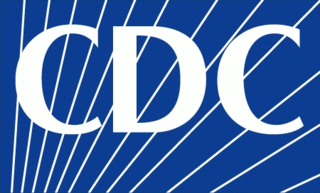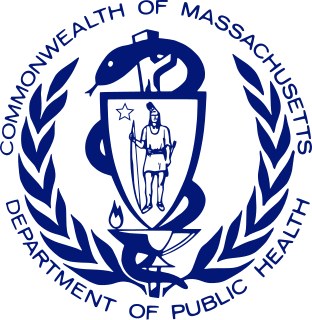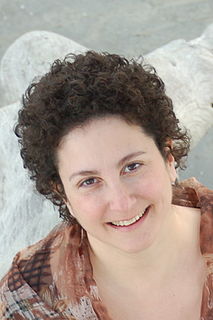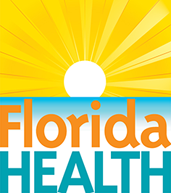
The Centers for Disease Control and Prevention (CDC) is the leading national public health institute of the United States. The CDC is a United States federal agency under the Department of Health and Human Services and is headquartered in Atlanta, Georgia.
The Council of State and Territorial Epidemiologists (CSTE) is a 501(c)(6) non-profit organization originally organized in 1955, founded in 1992, and based in Atlanta, Georgia. CSTE works to advance public health policy and workforce capacity for applied public health epidemiologists in all localities, states, and territories in the United States.

Preventive healthcare consists of measures taken for disease prevention. Disease and disability are affected by environmental factors, genetic predisposition, disease agents, and lifestyle choices and are dynamic processes which begin before individuals realize they are affected. Disease prevention relies on anticipatory actions that can be categorized as primal, primary, secondary, and tertiary prevention.

The New York City Department of Health and Mental Hygiene (DOHMH) is the department of the government of New York City responsible for public health along with issuing birth certificates, dog licenses, and conducting restaurant inspection and enforcement. The New York City Board of Health is part of the department. Its regulations are compiled in title 24 of the New York City Rules. Since September 1, 2018, the commissioner has been Dr. Oxiris Barbot.

Shahid Beheshti University of Medical Sciences is one of the three medical universities in Tehran, the capital of Iran. It began in 1961 with the establishment of the Schools of Medicine and Dentistry. Following the merging of some of the treatment and educational units and organizations affiliated to the then Ministry of Health and “Melli University” in 1986, Shahid Beheshti University of Medical Sciences began its activities independently.
C. Anderson (Andy) Johnson is University Professor at Claremont Graduate University (CGU) in Claremont, California. He was Founding Dean of the CGU School of Community and Global Health and served in that capacity from 2008 to 2013 when he assumed the position of CEO of the Community Translational Research Institute (CTRI), a not-for-profit research and education corporation headquartered in Riverside California. CTRI links public health, medical and health administration schools and departments at CGU, UC Riverside, Loma Linda University, and the University of La Verne with public health, health care and other community based institutions in Southern California, including the County of Riverside, the Inland Empire Health Plan, and municipalities, school systems and NGO's in the region for translating health promotion and disease prevention science into public policy and practice. His teaching in population health and prevention science at CGU links faculty and students with the practice of translational research.

The Massachusetts Department of Public Health is a governmental agency of the Commonwealth of Massachusetts with various responsibilities related to public health within that state. It is headquartered in Boston and headed by Commissioner Monica Bharel.
The Textbook of Military Medicine (TMM) is a series of volumes on military medicine published since 1989 by the Borden Institute, of the Office of The Surgeon General, of the United States Department of the Army. It constitutes a comprehensive, multi-volume treatise on the art and science of military medicine, as practiced by the United States armed forces. The books integrate lessons learned in past wars with current principles and practices of military medical doctrine.

Erica Frank is a U.S.-born educational innovator, physician, medical and educational researcher, and public health advocate. Since 2006, she has been a Professor and Canada Research Chair in the School of Population and Public Health, and the Department of Family Practice at the University of British Columbia (UBC). Her medical specialty is Preventive Medicine.

The Florida Department of Health is responsible for protecting the public health and safety of the residents and visitors of the state of Florida. It is a cabinet-level agency of the state government, headed by a state surgeon general who reports to the governor. The department has its headquarters in Tallahassee.
Surveillance for communicable diseases is the main public health surveillance activity in China. Currently, the disease surveillance system in China has three major components:
Ronald Mark Davis was an American physician who specialized in preventive medicine and was a public health and anti-tobacco advocate. Davis served a one-year term as president of the American Medical Association from 2006 to June 2007.
A state health agency (SHA), or state department of health, is a department or agency of the state governments of the United States focused on public health. The state secretary of health is a constitutional or at times a statutory official in several states of the United States. The position is the chief executive official for the state's state health agency, chief administrative officer for the state's Board of Health, or both.
The American Association of Public Health Physicians (AAPHP), is a professional association of public health physicians. Its motto is "the voice of Public Health Physicians / Guardians of the Public's Health".
Sir Nicholas John WaldFRCOG(ad eundum) FFPH qualified in medicine from University College London in 1967. He is currently Honorary Professor of Preventive Medicine, Institute of Health Informatics, University College London, Visiting Professor, Population Health Research Institute, St George's University of London and Honorary Consultant and Adjunct Professor, Brown University RI USA. He was Professor of Environmental and Preventive Medicine from 1983 to 2019 at St Bartholomew's Hospital Medical College later to become Barts and The London School of Medicine and Dentistry. He was co-founder of the Wolfson Institute of Preventive Medicine at Barts and The London School of Medicine and Dentistry and Chairman/Director from 1992-1995 and 1997-2013. He is "widely considered one of the world's leading epidemiologists".

K. Srinath Reddy is the president of the Public Health Foundation of India and formerly headed the Department of Cardiology at All India Institute of Medical Sciences (AIIMS).

Erica G. Schwartz is a U.S. Public Health Service Commissioned Corps rear admiral who currently serves as the Deputy Surgeon General of the United States. As a commissioned corps officer, she served with the U.S. Coast Guard as their Chief of Health Services and Chief of Preventive Medicine at the US Coast Guard headquarters and became its principal expert on flu pandemics. Prior to becoming Deputy Surgeon General, she served as the Coast Guard's Chief Medical Officer in 2015 to 2019. She assumed her current assignment on March 1, 2019.
This is a timeline of the United States Public Health Service Commissioned Corps and its predecessor, the Marine Hospital Service.
The Health Protection Surveillance Centre (HPSC) is part of the Irish Health Service Executive. HPSC was set up in 1998 and was formerly known as the National Disease Surveillance Centre (NDSC).








